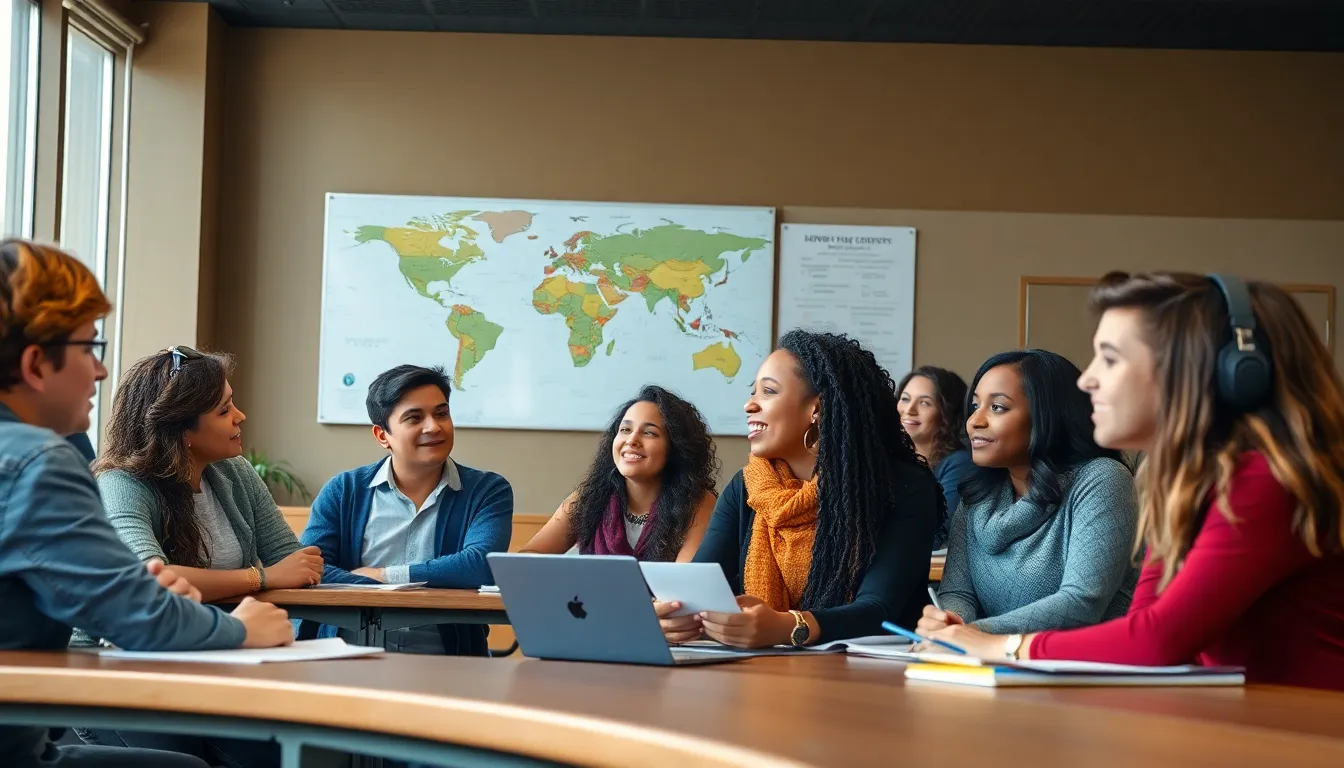Table of Contents
ToggleIn a world where global events unfold faster than a cat meme goes viral, understanding international relations has never been more critical. George Mason University’s Global Affairs program offers a front-row seat to the complexities of diplomacy, economics, and cultural exchanges that shape our planet. Students dive into the thrilling chaos of global politics while honing skills that make them the superheroes of tomorrow’s international arena.
Overview of Global Affairs GMU
George Mason University (GMU) offers a comprehensive Global Affairs program. This program equips students with critical knowledge on international relations. Courses include diplomacy, economics, and cultural exchanges. Students explore intricate global issues while developing analytical skills vital for addressing these challenges.
Special emphasis is placed on real-world applications. Students engage in internships and research opportunities, enhancing their practical experience. Networking with professionals in the field strengthens their connections and career prospects. Graduates often find roles in government, non-profit organizations, and multinational corporations.
The curriculum is designed to foster interdisciplinary learning. Faculty members bring diverse backgrounds, enriching the educational experience. By collaborating with peers from various disciplines, students gain multifaceted perspectives on global issues. This collaborative environment promotes the exchange of innovative ideas.
Furthermore, GMU’s location in the Washington, D.C. metropolitan area provides unique advantages. Proximity to key political and economic institutions enhances learning and professional development. Visiting speakers from prominent organizations further enrich students’ understanding of global affairs.
In addition, GMU features opportunities for global engagement through study abroad programs. These programs immerse students in different cultures, promoting firsthand experience in international contexts. Such exposure prepares graduates to approach global challenges with cultural competence.
Overall, GMU’s Global Affairs program creates informed, skilled professionals. The program’s focus on practical experience and theoretical foundations enables students to succeed in a complex world. With robust support and resources, they are well-prepared to make significant contributions on the global stage.
Academic Programs Offered

George Mason University provides a robust array of academic programs in the field of Global Affairs. These programs cater to the diverse interests of students aiming to excel in international relations.
Undergraduate Degrees
Undergraduates can pursue a Bachelor’s degree in Global Affairs. This program emphasizes theoretical frameworks and practical skills. Key courses cover topics such as international development, security policy, and global economic strategies. Students engage in internships and community projects, enhancing their real-world experience. Opportunities for research further enrich academic learning. The curriculum promotes interdisciplinary approaches, integrating insights from political science, economics, and cultural studies.
Graduate Degrees
Graduate students can opt for a Master’s degree in Global Affairs. This advanced program focuses on developing leadership skills and analytical thinking. Core courses address pressing global issues like conflict resolution, human rights, and international economics. Students participate in seminars and collaborate on research projects with faculty experts. Professional development resources, including networking events and internships, significantly enhance career readiness. The program prepares graduates for roles in various sectors, including government, non-profits, and international organizations.
Key Faculty and Research Areas
George Mason University’s Global Affairs program features a notable faculty committed to diverse academic disciplines. Faculty members conduct research on global security, international economics, and human rights. Scholars like Dr. Janelle Dempsey concentrate on conflict resolution strategies.
In addition, Dr. John McNulty focuses on the intersection of international politics and economics. His research explores the implications of trade policies on global relations. Faculty actively engage in interdisciplinary approaches, enhancing curriculum relevance.
Research areas reflect current global challenges. Students participate in projects addressing climate change, migration, and international governance. The faculty encourages collaboration between students and professionals, strengthening academic theory with practical applications.
GMU’s faculty maintains partnerships with think tanks and governmental agencies. These collaborations provide students with networking opportunities and exposure to real-world policymaking. Students gain insights through internships at organizations like the U.S. State Department and the United Nations.
Community outreach initiatives are also integral to the program. Faculty guide students in engaging with local and global communities. Students develop leadership skills while contributing to public discourse on pressing issues.
Access to experienced faculty enhances the learning experience. Research projects often lead to publications and presentations at conferences. Distinct research areas foster expertise, preparing students for competitive roles in various sectors.
GMU stands out through its commitment to cultivating knowledgeable professionals. Faculty’s expertise and research pursuits shape the program’s academic environment, ensuring students are equipped to tackle future challenges in global affairs.
Student Organizations and Activities
Student organizations at George Mason University play a vital role in the Global Affairs program. These groups enhance learning and foster networking among students with shared interests.
The International Relations Club offers members opportunities to engage in discussions about global issues. This organization organizes speakers from various sectors to deepen students’ understanding of international relations.
Model United Nations provides practical experience in diplomacy. Participants simulate UN meetings and practice negotiation skills, enhancing their comprehension of global governance.
Another significant group, Student Government, actively represents student interests. It involves students in policy-making decisions, allowing them to connect with university administration on important matters.
The Global Affairs Society promotes cultural awareness through events and discussions. It hosts panels featuring experts who address topics such as human rights and international security.
Internship networks connect students with local and national organizations. These opportunities allow students to apply classroom knowledge in real-world settings, strengthening their professional development.
Students also engage in social activities that promote team-building and leadership skills. Activities range from cultural nights to service projects, enriching their college experience.
Clubs emphasize collaboration across disciplines. Members from various backgrounds come together, encouraging diverse perspectives on global challenges.
Engagement in these organizations leads to personal and professional growth. Students often gain practical skills, expand their networks, and develop a deeper appreciation for international affairs.
Through these activities, GMU cultivates informed, active citizens ready to tackle complex global issues. Each organization contributes uniquely to the learning environment, enhancing overall educational outcomes for Global Affairs students.
Career Opportunities and Alumni Network
George Mason University’s Global Affairs program opens diverse career pathways for graduates. Many alumni find roles in government agencies, non-profit organizations, and multinational corporations, leveraging their skills in international relations. Internships and networking events enhance employability through practical experience and connections.
The alumni network proves invaluable for current students. Events hosted by graduates, such as speaker series and career panels, provide insights into various industries. Alumni frequently share job opportunities, mentorship, and advice, fostering a supportive community.
Internships form a crucial part of the program, connecting students with prospective employers. Specific organizations, such as the U.S. State Department and NGOs, offer positions that align with academic learning. Students gain hands-on experience, preparing them for the competitive job market.
Networking remains an essential element of the GMU experience. Career fairs attract recruiters, offering students direct access to potential employers. The Global Affairs Society facilitates formal and informal gatherings, encouraging connections that span disciplines and industries.
Community engagement initiatives also bolster professional development. Programs focused on outreach allow students to apply their knowledge while contributing to local and international discussions. Real-world challenges tackled in these initiatives enhance problem-solving skills sought by employers.
GMU’s unique location in the Washington, D.C. area provides additional advantages. Proximity to political and economic institutions enables students to engage directly with key stakeholders. This access enriches educational experiences, offering a practical perspective on global affairs.
Diverse career opportunities, a robust alumni network, and active community engagement underscore the value of GMU’s Global Affairs program. Graduates emerge equipped to make impactful contributions in a variety of sectors.
George Mason University’s Global Affairs program stands out as a premier choice for students eager to make their mark in international relations. With its comprehensive curriculum and real-world applications students gain essential insights and skills that prepare them for impactful careers. The program’s unique location in Washington D.C. provides unparalleled access to influential institutions and networking opportunities.
Through interdisciplinary learning and community engagement students develop a well-rounded perspective on global issues. The strong alumni network and internship connections further enhance career prospects. Graduates emerge as informed leaders ready to address the complexities of today’s global landscape.




